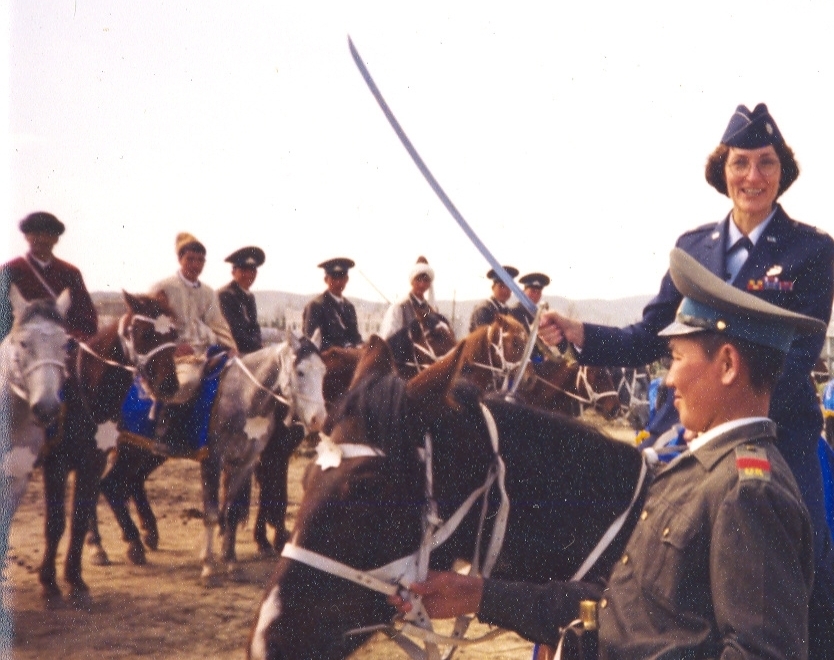     
The Soldiers’ Mothers and Democratic Military Reform
by
Brenda Vallance
For those of us who study democratization and military
reform, our wait for change in Russia has been both long and
hopeless. Despite the lack of reform initiated by government or
military leaders, the one bright light in this wait, I would
argue, is that organizations within Russia’s civil society have
pushed for military reform.
The primary organizations leading this effort are the Union of
the Committee of Soldiers’ Mothers of Russia (Union of CSMR)
with its 53 branches across Russia and the independent Soldiers’
Mothers Organization (SMO) of St Petersburg.
These organizations are frequently labeled as human rights and
peace organizations. However, I would argue that these labels do
not capture the vast activities in which these organizations
partake and therefore underestimate the amount of social capital
developed by them. One of the most important of these activities
is educating Russian civil society on the rule of law in
relation to service in the military, as well as informing
society about what the armed forces should look like in a
democratic society. They provide free legal advice to soldiers
and their families about their rights and conscription laws, as
well as intervening on behalf of soldiers who are facing abuse
and hazing from their superiors and other more senior soldiers
(dedovshchina).
In addition to lobbying the State Duma for laws protecting
citizens’ rights, especially in the areas of conscription,
brutal hazing, and alternative service, the organizations have
brought considerable pressure on military leaders and
politicians to truthfully report violations of soldiers’ rights.
Based on their past successes, Russian citizens are comfortable
turning to the Soldiers’ Mothers for assistance and generally
view them as a reliable method of fighting military bureaucracy.
In addition to the services they provide Russia’s citizens, the
Soldiers’ Mothers have been important information conduits for
foreign organizations and media examining the human rights
environment in Russia. Information provided by these
organizations has been used by the U.S. State Department, the
U.N. Human Rights Commission, and the European Parliament. These
evaluations of Russia’s human rights status, as well as media
reports, frequently note that the Soldiers’ Mothers’ collection
of data on soldiers killed and missing in Chechnya, and
incidences of casualties associated with hazing is more reliable
than any official government source.
As a result of these activities, the CSMR was nominated for the
Nobel Peace Prize in 1996 and was awarded the Right Livelihood
Award, also known as the ‘Alternative Nobel Prize.’ Not only
have they received praise from outside Russia, but also within
Russia for their commitment to human rights and the rule of law.
A leading figure in Russia’s human rights movement once noted
that the Soldiers’ Mothers were the most successful of Russia’s
human rights organizations while a leading Russian sociologists
said that ‘these tough middle-aged matrons can instill respect
in Army men as only mother figures can.’ (see Yelena
Zdravomyslova in Russia's
Powerhouses of Dissent: Mothers,
Christian Science Monitor,
24 Feb 2000).
In 2004 the CSMR took their movement one step further by
announcing the formation of a new political party “the United
People’s Party of Soldiers’ Mothers.” It is too early to say how
the party will fare in the political realm, but judging by their
past successes and resolve, Russia’s mothers will continue their
role of leading Russia’s society toward military reform and
democracy.
June, 2005

Lieutenant Colonel Brenda Vallance (USAF, Ret) began
studying the Soviet Union and Russia as a foreign language
student at the University of Texas at Arlington. In 1973 her
father insisted she take her first trip to the Soviet Union,
despite the fact that she argued she’d rather have a new car!
Her father’s insistence resulted in 30+ years of study and
travel centered on Russia and the former Soviet Union. Since the
first trip, she has visited the area an additional 8 times and
completed her PhD in Political Science from UCLA where she
focused on Comparative Politics, Democratization, and Russian
Studies. While working on her PhD she was a Fellow with the
RAND/UCLA Center for Soviet (later Russian) Studies. In 2003 she
was a Fulbright Scholar and taught graduate and undergraduate
courses at the University of Latvia. Dr Vallance will be the
Dean of the School of Behavioral and Social Sciences, St
Edward’s University, in Austin, TX beginning 1 August, 2005.
Brenda Vallance can be contacted at
brendav (at)
admin.stedwards.edu
|